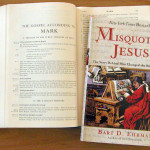Is God Pro-Life or Pro-Death?
by Dr. Matthew Ramage
Filed under Christianity and Violence, The Bible, The Problem of Evil
This is the second in a series of posts on the “dark passages” of the Bible. These are texts which understandably raise the eyebrows of both nonbelievers and believers who encounter them and say, “How can that be in the Bible if it is God’s own word?” In my previous post I took up the problem of violent Old Testament passages in light of Pope Benedict XVI’s claim that violence is contrary to God’s nature. My book Dark Passages of the Bible likewise deals with this and various other areas of the Bible that seem to contradict what Christians believe today. Today I’d like to comment on Psalm 137, a short text which is at once one of the most profound as well as troubling imprecatory texts in the Bible.
In Psalm 137 we have before us a hymn whose context is clearly exilic, meaning that it was written after the Jewish people had been carted off into Babylon in 586 B.C. Before discussing, we should read the poem in its entirety:
"By the waters of Babylon,
there we sat down and wept,
when we remembered Zion.
On the willows there
we hung up our lyres.
For there our captors
required of us songs,
and our tormentors, mirth, saying,
“Sing us one of the songs of Zion!”
How shall we sing the LORD's song
in a foreign land?
If I forget you, O Jerusalem,
let my right hand wither!
Let my tongue cleave to the roof of my mouth,
if I do not remember you,
if I do not set Jerusalem
above my highest joy!
Remember, O LORD, against the E'domites
the day of Jerusalem,
how they said, “Rase it, rase it!
Down to its foundations!”
O daughter of Babylon, you devastator!
Happy shall he be who requites you
with what you have done to us!
Happy shall he be who takes your little ones
and dashes them against the rock!"
The plain sense of the last pair of verses is a proclamation of blessing—in particular that a man will be blessed by God because he has killed his captors’ little children. This is a point at which atheists understandably say to believers, “Really, your God would bless that type of person? What a hateful, pathetic, bloodthirsty god—a god made in man’s image indeed! This doesn’t sound like a very ‘pro-life’ God.” Even C.S. Lewis, in his Reflections on the Psalms, describes Psalm 137’s concluding outburst as “devilish.” According to Lewis, the harboring of animosity is at once “profoundly natural” but also “profoundly wrong.” Does this mean it shouldn’t be in the Bible or that it constitutes an error on God’s part?
Though Psalm 137 does not have God directly making this troublesome curse, the problem cannot be skirted merely by pointing out that the human author is the one saying these hateful things rather than God. Why does this not help? For traditional orthodox Christianity, which includes Catholicism, the Bible is God’s word in human words, and we believe that lying, falsehood, and hatred are incompatible with the nature of God. As the Second Vatican Council authoritatively put it, whatever Scripture’s human authors assert is also asserted by the Holy Spirit. Therefore, if the human author of Psalm 137 asserts an error, we are saying that the Holy Spirit is also asserting an error.
For a Catholic, the question ultimately then revolves around the following question: what precisely was the human author of Psalm 137 asserting? In Catholic biblical exegesis, this assertion refers to the primary message an author wishes to teach or communicate. For a Catholic, the doctrines of biblical inspiration and inerrancy do not mean that every sentence in the Bible is a reflection of God’s mind on a given matter. Rather, the Bible is God’s word in human words. To use an expression from the Church Fathers, it was part of his divine pedagogy or teaching method to gradually reveal himself to his people. As part of this process, he accommodated himself to our human weaknesses and ennobled feeble humans in such a way that they have become bearers of his word. Naturally, these humans were not going to perceive God’s will perfectly from day one of his divine revelation but rather grow in this perception over time. This is why Pope Benedict states that Catholics should not simplistically treat any given Old Testament text as a definitive illustration of how we ought to act or believe without seeing it as part of a plan that is fully revealed only in the person of Jesus Christ. Unfortunately, when Christians are challenged by non-believers to defend a particular Old Testament passage, they end up trying to defend the indefensible and, to borrow an expression from Thomas Aquinas, thereby make the faith look ridiculous.
What, then, is the assertion of Psalm 137? The Catholic must first be clear that it is not to teach that celebration is in order when the children of our enemies are killed. Now if you are an atheist, you are probably (and understandably) going to respond: “You’re pre-determining that this biblical text can’t be saying the crazy thing it seems to say since you’ve already begun with the assumption that it can’t be wrong.” Believe it or not, the Catholic would actually agree with the atheist here. Yes, our prior commitment to Jesus Christ and the truth of the Bible does a priori preclude the possibility that God’s revealed word asserts error.
But does this mean that the Catholic position is irrational and indefensible? As I said in my previous post, Catholics can’t expect a nonbeliever to accept our particular interpretation of a text like Psalm 137 if said person hasn’t first accepted the existence of God, the incarnation of Christ, and the Bible as his revealed word expressed in human words. What we can do is offer a reasoned explanation for the presence of thorny texts in such a way that one could see how it would be illuminating if faith in Christ is granted.
Up to this point I have merely been discussing what Psalm 137 does not intend to teach, but we also have to offer a positive statement of what the author intended to assert. In the present psalm as in any biblical text, an author might wish to make multiple points. In this case, there are two related purposes of the psalm when read in light of the whole. On the one hand, it is a hymn of hope for liberation and confidence in God’s covenant faithfulness. Thus the beautiful words in which the psalmist reminds the people of God’s promise: “If I forget you, O Jerusalem, let my right hand wither!” God has bound himself to Israel in covenant. He cannot go back on his promise to remember his people.
Though expressive of hope, Psalm 137 is at the same time a national hymn of sorrow. As the text relates, Israelites cast into Babylonian captivity wept bitterly as they were mocked by their captors who asked them to sing songs of their native land which had just been destroyed. The psalm is thus an occasion for the nation to pour out its anguish to God over the loss of land, family, and cult. Its aim is not to assert a universal truth claim about children in relation to evil and revenge. One cannot simply isolate the last pair of verses from the context and message of the whole. Rather, the central thrust of Psalm 137 is its cry of longing for God and for God’s good gifts to be restored.
To be sure, the frightful side of human nature shines through in this psalm, but for the Christian this makes the text all the more real, more meaningful. In this way it becomes a prayer which we today (with proper caution and making due distinctions) can each take up in our own lives. Catholics call this the moral sense of the text, an application to our own life’s circumstances of what we have learned from the experience of God’s people in ages past. We today find in our own heart the same emotions of despair and hope, hatred and love, that God’s people of old experienced. The psalm teaches us that we should not try to hide our deepest and darkest thoughts from God. Rather the psalms teach us to get these out in the open so that God can help us live our sorrows in him and eventually heal our brokenness.
A final dimension of Psalm 137’s moral sense is something picked up on by Christianity already in its first centuries of reflection upon the text. I refer here to the beautiful and practical exegesis of Origen in his important treatise Against Celsus. Following the familiar lines of patristic-medieval thought, he comments:
"The just give up to destruction all their enemies, that is to say their vices, so that they do not spare even the children, that is, the early beginnings and promptings of evil. In this sense also we understand the language of Psalm 137...For, “the little ones of Babylon” (which signifies confusion) are those troublesome sinful thoughts that arise in the soul, and one who subdues them by striking, as it were, their heads against the firm and solid strength of reason and truth, is the person who “dashes the little ones against the stones”; and he is therefore truly blessed."
For Origen, there is no question as to the psalm’s meaning: the “little ones” who are to be slain are not human children but rather “the early beginnings and promptings of evil.” He justifies the psalmist’s words by appealing to the etymology of the word Babylon, which is related to the word “confusion.” According to Origen, these nascent vices are called “the little ones of Babylon” because they arise in the form of troubling thoughts that confuse one’s soul. The message of the psalm is that we should put an end to our evil behavior at its outset—when it is still in its infancy, so to speak—lest it eventually develop into an unbreakable vice.
In line with centuries of Catholic thought, I believe that Origen’s interpretation is spot on. However, I would also caution believers that it is not sufficient on its own. Catholics out there who think that jumping to this moral sense of Psalm 137 does justice to its violent outburst of vengeance need to ask themselves: Does Origen’s exegesis respect the text of Psalm 137? Yes, the Catholic should happily recognize the spiritual sense of the text, but was the psalmist really thinking about crushing his vices when he composed this psalm? While some Catholics refuse to admit that the psalmist actually entertained the hateful thoughts he appears to entertain, the principles I have offered above are an attempt to seek truth in the text while admitting the presence of troubling statements which atheists (rightly, I believe) take to be obviously at odds with the nature of God if such a being exists.
In any event, I think any Christian—and indeed any person who reflects upon his vices—can find great wisdom for life in Origen’s approach to Psalm 137. Regardless of whether my above attempt to determine the text’s literal sense is sound, I hope we would all be able to learn from Origen’s exhortation to blot out nascent defects in our lives before they grow up and develop into full-fledged vices. This is precisely the sort of exegesis that makes a difference in our lives, and for the Catholic it represents the most important purpose of the Bible. But he who wishes to truly appreciate Scripture must pay attention to both its spiritual and literal senses. As I put it in a recent interview with Brandon Vogt, Catholics must beware of whitewashing difficult biblical texts by jumping to their spiritual sense without seriously taking into account the challenges these texts present on the literal level.
To conclude, I’d like to acknowledge and reiterate that ascertaining a biblical text’s intention is not always an easy task. Catholics must respectfully disagree with some of our Protestant brethren who believe that the Bible’s meaning is perspicuous. Exegesis often requires a lot more patience and skill than many Christians possess. Above all, it requires us to recognize that the many troublesome passages of the Old Testament ultimately only make sense insofar as they are seen as part of a progressive revelation by which God gradually prepared his people for the coming of Christ. In the words of Pope Benedict, which I cited in my previous post, “It follows straightaway that neither the criterion of inspiration nor that of infallibility can be applied mechanically. It is quite impossible to pick out one single sentence [of the Bible] and say, right, you find this sentence in God’s great book, so it must simply be true in itself.” According to Pope Benedict, problematic passages in the Old Testament are “valid insofar as they are part of the history leading up to Christ.”
On the same token, biblical exegesis also requires a degree of intellectual humility that I find atheists and believers alike sometimes lack. Especially in today’s world where we get much of our information in short bursts of data via social media outlets, it is very common to find folks assuming that if they don’t understand a claim at first glance or if its meaning is not readily apparent to them, then it’s not true. When the Catholic asks for the chance to clarify or make further distinctions, atheists often accuse him of backpedaling, covering his tracks, or obfuscating the ostensible meaning of the text he is trying to defend.
When I engage in discussions like the present one—especially in an online context—I am always reminded of C.S. Lewis’ words in his book Miracles. Explaining Christianity to someone who thinks it is easy and simple is a lot like trying to explain quantum physics to someone who conceives of atoms as tiny little balls which comprise everything in the material universe. At every turn we have to multiply distinctions and rule out false analogies proffered by our interlocutors. It sounds a lot like backtracking, and sometimes it is in fact backtracking. But sometimes this is what it takes in order to make a reasonably adequate explanation for something immense and beautiful. If Christianity is true, then it is with good reason that Catholicism has long regarded theology as “queen of the sciences,” the study of that being who is most immense and beautiful.
Related Posts
Note: Our goal is to cultivate serious and respectful dialogue. While it's OK to disagree—even encouraged!—any snarky, offensive, or off-topic comments will be deleted. Before commenting please read the Commenting Rules and Tips. If you're having trouble commenting, read the Commenting Instructions.













